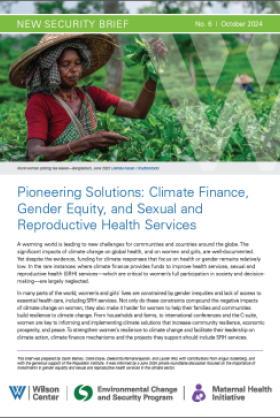Pioneering Solutions: Climate Finance, Gender Equity, and Sexual and Reproductive Health Services



A warming world is leading to new challenges for communities and countries around the globe. The significant impacts of climate change on global health, and on women and girls, are well-documented. Yet despite the evidence, funding for climate responses that focus on health or gender remains relatively low. In the rare instances where climate finance provides funds to improve health services, sexual and reproductive health (SRH) services—which are critical to women’s full participation in society and decisionmaking—are largely neglected.
In a new policy brief, “Pioneering Solutions: Climate Finance, Gender Equity, and Sexual and Reproductive Health Services” the Wilson Center’s Environmental Change and Security Program and Maternal Health Initiative explore the relationships between climate finance, gender equality, and sexual and reproductive health, and identify opportunities for including SRH services in climate financing mechanisms and projects.
Authors





Environmental Change and Security Program
The Environmental Change and Security Program (ECSP) explores the connections between environmental change, health, and population dynamics and their links to conflict, human insecurity, and foreign policy. Read more


Maternal Health Initiative
Housed within the Wilson Center's Environmental Change and Security Program, the Maternal Health Initiative (MHI) leads the Wilson Center’s work on maternal health, global health equity, and gender equality. Read more

Explore More
Browse Insights & Analysis
Can Climate-Resilient Agriculture Become an Engine for Syria’s Post-Conflict Recovery?

ECSP Weekly Watch | March 10 – 14

ECSP Weekly Watch | February 17 – 21
